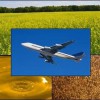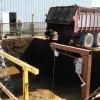 Brassica carinata is a promising oilseed crop with great potential for profitable cultivation in Florida. Its high oil content and favorable fatty acid profile make it suitable for the biofuel industry, especially as a biojet fuel. The UF/IFAS North Florida Research and Education Center (NFREC) in Quincy, Florida, has been working to identify advanced carinata genotypes that are high yielding (seed and oil), disease resistant, early maturing, and adapted to Florida. The work at NFREC is being done in conjunction with Agrisoma Biosciences Inc., a crop company that has the world’s largest collection of carinata germplasm. This 6-page fact sheet’s “Agronomic Management” section provides recommendations resulting from NFREC’s research. was written by C. M. Bliss, R. Seepaul, D. L. Wright, J. J. Marois, R. Leon, N. Dufault, S. George, and S. M. Olson, and published by the UF Department of Agronomy, December 2014.
Brassica carinata is a promising oilseed crop with great potential for profitable cultivation in Florida. Its high oil content and favorable fatty acid profile make it suitable for the biofuel industry, especially as a biojet fuel. The UF/IFAS North Florida Research and Education Center (NFREC) in Quincy, Florida, has been working to identify advanced carinata genotypes that are high yielding (seed and oil), disease resistant, early maturing, and adapted to Florida. The work at NFREC is being done in conjunction with Agrisoma Biosciences Inc., a crop company that has the world’s largest collection of carinata germplasm. This 6-page fact sheet’s “Agronomic Management” section provides recommendations resulting from NFREC’s research. was written by C. M. Bliss, R. Seepaul, D. L. Wright, J. J. Marois, R. Leon, N. Dufault, S. George, and S. M. Olson, and published by the UF Department of Agronomy, December 2014.
http://edis.ifas.ufl.edu/ag389
Tag: NIFA-Sustainable Energy
Anaerobic Digesters for Manure Management for Livestock Operations
 Livestock wastes can be important sources of nutrients for crops, but manure must be managed properly to prevent loss of nutrients to the environment in air or ground and/or surface water. Stabilization of manure is important prior to successfully recycling the organic material back to arable lands. Methods for stabilizing livestock wastes include composting, aerobic digestion, anaerobic digestion, lime stabilization, and heat drying. The stabilization process reduces the organic matter and water contents, unpleasant odors, concentrations of pathogenic microorganisms, and weed seeds. Anaerobic digestion (AD), which is the topic of this fact sheet, also results in the production of renewable energy in the form of methane-rich biogas. This 10-page fact sheet informs farmers and Extension agents about types of anaerobic digester systems used in the United States with various manure-handling systems. It points out digester systems currently being used in Florida and the benefits of managing livestock manure with a digester system. Written by Rishi Prasad, George Hochmuth, and Ann C. Wilkie, and published by the UF Department of Soil and Water Science, March 2014.
Livestock wastes can be important sources of nutrients for crops, but manure must be managed properly to prevent loss of nutrients to the environment in air or ground and/or surface water. Stabilization of manure is important prior to successfully recycling the organic material back to arable lands. Methods for stabilizing livestock wastes include composting, aerobic digestion, anaerobic digestion, lime stabilization, and heat drying. The stabilization process reduces the organic matter and water contents, unpleasant odors, concentrations of pathogenic microorganisms, and weed seeds. Anaerobic digestion (AD), which is the topic of this fact sheet, also results in the production of renewable energy in the form of methane-rich biogas. This 10-page fact sheet informs farmers and Extension agents about types of anaerobic digester systems used in the United States with various manure-handling systems. It points out digester systems currently being used in Florida and the benefits of managing livestock manure with a digester system. Written by Rishi Prasad, George Hochmuth, and Ann C. Wilkie, and published by the UF Department of Soil and Water Science, March 2014.
http://edis.ifas.ufl.edu/ss615